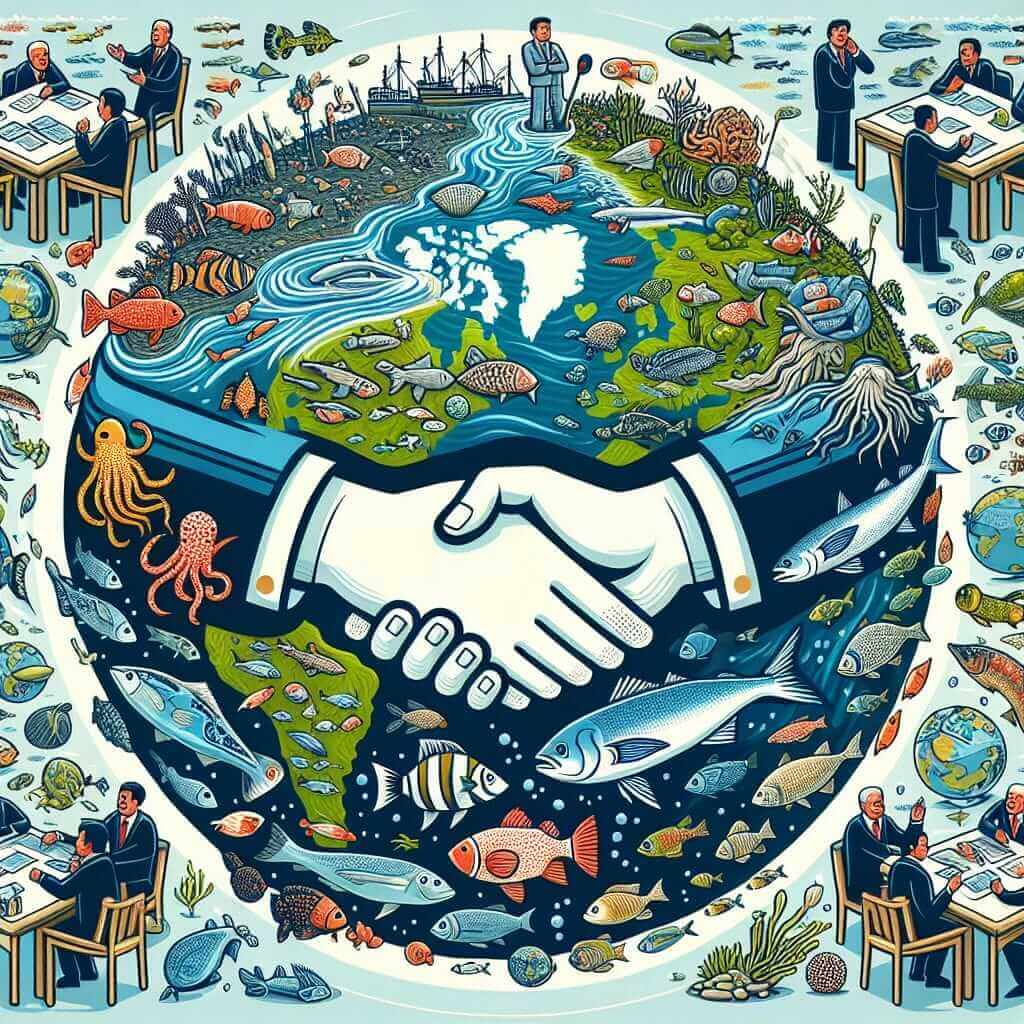The IELTS Reading section is a crucial part of the IELTS exam, consisting of three reading passages of increasing difficulty. This task tests your reading comprehension skills, including the ability to identify key ideas, understand detailed information, and make inferences. One of the trending topics that might appear in the Reading test is “How is climate change affecting global fisheries management?” This is not merely a topic of current affairs but a highly relevant global issue. Past data suggests that topics related to environmental changes and their impact on various sectors have appeared frequently, indicating a high possibility of reoccurrence in future exams.
Climate Change and Global Fisheries Management: A Sample Reading Passage
Here is a practice reading passage, modeled closely after the real IELTS format. The text below can be classified as Medium Text.
Reading Passage
Climate change is increasingly impacting global fisheries, creating numerous challenges for fisheries management worldwide. Changes in ocean temperature and acidification are two primary forces driving these impacts.
Firstly, rising sea temperatures are causing shifts in fish populations. Many species are moving towards cooler waters, disrupting traditional fishing grounds. In the North Atlantic, for example, cod and haddock, which have been staples of local fisheries for centuries, are gradually migrating northwards, making it tougher for fishermen in their historical fishing areas.
This northward migration leads to overfishing in new areas and underutilization of the old fishing zones. As fish populations relocate, their predators and prey, which are linked through the marine food web, also shift, causing a ripple effect throughout the ecosystem.
Ocean acidification, caused by increased CO2 absorption, is another significant issue. Acidic waters affect the calcification process in shellfish, impairing their ability to form shells. This has substantial economic implications, particularly in regions that depend heavily on shellfish fisheries. For instance, the Northwest Pacific has experienced declines in shellfish populations, directly affecting the livelihood of local communities.
The complexity of these challenges requires adaptable and forward-thinking fisheries management strategies. Traditional management approaches, often regional or national in scope, may no longer be sufficient. Fisheries management must now incorporate global-scale considerations and predictive modeling to anticipate changes and plan accordingly.
International cooperation plays a vital role in this adaptive management. Shared fisheries that cross national boundaries require coordinated policies to ensure sustainability. Organizations like the Food and Agriculture Organization (FAO) and regional fisheries management organizations (RFMOs) are working towards holistic management strategies that consider the broader impacts of climate change.
In conclusion, climate change poses significant challenges to global fisheries management, necessitating a shift from localized to more comprehensive approaches. Only through international cooperation and innovative management strategies can we ensure the sustainability of global fish stocks for future generations.

Practice Questions
Based on the passage above, answer the following questions:
Multiple Choice
- What is the primary cause of the northward migration of fish species?
a) Increased fishing activities
b) Ocean acidification
c) Rising sea temperatures
d) Pollution in the waters
True/False/Not Given
- Traditional fishing areas are becoming more productive due to fish migration.
True / False / Not Given
Matching Information
-
Match the challenges to their corresponding descriptions:
- Rising sea temperatures
- Ocean acidification
Descriptions:
- ___ Causes shifts in fish populations toward cooler waters.
- ___ Affects the calcification process in shellfish.
Summary Completion
Complete the summary using the list of words below:
(Fishermen, cooperative, ecosystems, acidification)
Climate change impacts fisheries through rising sea temperatures and ocean . Fish populations are relocating, affecting entire marine . Fisheries management must now adopt a more global and ____ approach to ensure sustainability.
Answer Key
Multiple Choice
- c) Rising sea temperatures
True/False/Not Given
- False
Matching Information
-
- Rising sea temperatures: Causes shifts in fish populations toward cooler waters.
- Ocean acidification: Affects the calcification process in shellfish.
Summary Completion
Climate change impacts fisheries through rising sea temperatures and ocean acidification. Fish populations are relocating, affecting entire marine ecosystems. Fisheries management must now adopt a more global and cooperative approach to ensure sustainability.
Common Mistakes and Tips
- Not identifying key points: Focus on understanding the main ideas and supporting details.
- Misinterpreting the questions: Pay attention to what each question is asking.
- Guessing answers: Always base your answers on the information provided in the passage.
Vocabulary
Below are some challenging words from the passage:
- Migration (n): the movement of large numbers of people, birds or animals from one place to another.
- /maɪˈɡreɪ.ʃən/
- Acidification (n): the process of becoming acid or more acidic.
- /əˌsɪd.ɪ.fɪˈkeɪ.ʃən/
- Ecosystem (n): all the living things in an area and the way they affect each other and the environment.
- /ˈiː.kəʊˌsɪs.təm/
Grammar Focus
Relative Clauses: Used to provide additional information about a noun without starting a new sentence.
- Example: “Fishermen in their historical fishing areas are finding it tougher as species migrate to new regions.”
- Structure: noun + relative pronoun + verb (the clause that follows the relative pronoun describes the noun)
Tips for IELTS Reading Success
- Practice regularly: Consistent practice helps you become familiar with different question types and themes.
- Skimming and Scanning: Learn to quickly identify key points and information.
- Time Management: Allocate your time appropriately to ensure you complete all sections within the given time frame.
- Understand the Questions: Make sure you clearly understand what each question requires before answering.
By following these guidelines and practicing thoroughly, you can enhance your reading comprehension skills and perform more effectively in the IELTS Reading section. Good luck!